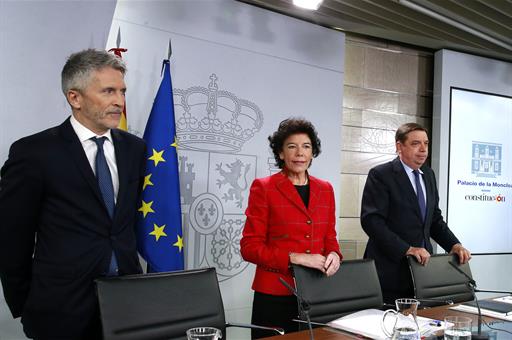Council of Ministers
Government agrees a Comprehensive Plan to stimulate Campo de Gibraltar
Council of Ministers - 2018.11.16
Moncloa Palace, Madrid
The Minister for Home Affairs, Fernando Grande-Marlaska, outlined the main measures contained in the Plan for Gibraltar, which provides for an investment of more than 900 million euros in medium- and long-term actions.
Fernando Grande-Marlaska recalled that unemployment in the region stands at 25%, 10 points above the national average, and that "this has hit young people and the long-term unemployed hard". He also underlined the relationship between Campo de Gibraltar and Brexit: "Almost 10,000 Spanish workers travel to and from Gibraltar every day for work reasons".
For that reason, the Plan contains labour measures designed to reduce the high unemployment rate. An Extraordinary Employment Plan for Andalusia will be drawn up that will include a specific section for this district. "This is an additional item of funding to the one annually distributed to the autonomous regions through the State Public Employment Service, in addition to the resources provided by the European Social Fund", specified the minister.
In addition, a Regional Investment Office will be set up to implement actions on employment, training, education and social inclusion. This Office will report on potential European subsidies for companies, citizens and third sector bodies. The government will also try and ensure that the upcoming EU Multiannual Financial Framework allocates items for specific actions in Campo de Gibraltar.
The minister highlighted that, in order to modernise infrastructures, foster goods transport and reactivate the economy in the region, particularly at Algeciras Port, the Ministry of Public Works plans to make an 810-million euro investment in railway and highway actions.
On economic and tax matters, Fernando Grande-Marlaska announced that a new customs-free zone will be created in the municipality of Los Barrios, with a surface area of 130,000 square metres, which is due to start operating in the first quarter of 2019.
Fight against money laundering
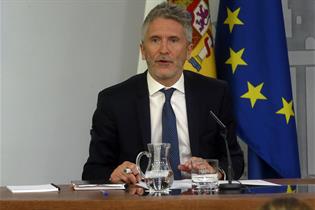 Pool Moncloa/JM CuadradoFernando Grande-Marlaska explained that the Ministries of Economy and Business, of Justice, and of Home Affairs want to focus on the fight against money laundering. To this end, measures will be adopted to "detect abnormal transactions early and strengthen prevention and response mechanisms".
Pool Moncloa/JM CuadradoFernando Grande-Marlaska explained that the Ministries of Economy and Business, of Justice, and of Home Affairs want to focus on the fight against money laundering. To this end, measures will be adopted to "detect abnormal transactions early and strengthen prevention and response mechanisms".
The Plan includes initiatives to promote local entrepreneurship and help SMEs. It also provides for the creation of a Digital Innovation and Entrepreneurship Centre in order to provide support for digital transformation and innovation processes in companies.
The Ministry of Industry, Trade and Tourism will set up a subsidy programme to promote and stimulate these areas. The minister specified that these subsidies will range between 50,000 and 150,000 euros.
In terms of justice and home affairs, Fernando Grande-Marlaska announced that the creation of three new courthouses will be approved in Algeciras, La Línea and San Roque, in addition to the 10 pre-existing courthouses in the region. Along the same line of speeding up the administration of justice, 12 posts will be created for prosecutors specialised in the fight against drug smuggling and corruption, other posts for public servants and on-call services will be strengthened.
An administrative unit will also be incorporated under the Office to Recover and Manage Archives (Spanish acronym: ORGA), designed to step up and improve actions to prevent, investigate, prosecute and eliminate crime.
The minister stated that the workforce of the police and the Guardia Civil has been increased, as well as material and technical resources. In this regard, he recalled that the government allocated 7.3 million euros in the initial phase, and this commitment will continue in 2019, "with a budgetary provision of just over 21 million euros".
Education
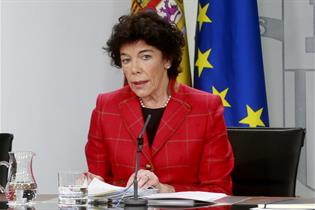 Pool Moncloa/JM CuadradoFor her part, the Minister for Education and Vocational Training, and Government Spokesperson, Isabel Celaá, announced that training programmes will be offered to adults with limited qualifications or lacking a minimum professional certificate, with the aim of fostering their reinsertion in the job market. He specified that this training will be geared towards those fields with the greatest demand, including graphic design, modelling and animation, and tele-assistance.
Pool Moncloa/JM CuadradoFor her part, the Minister for Education and Vocational Training, and Government Spokesperson, Isabel Celaá, announced that training programmes will be offered to adults with limited qualifications or lacking a minimum professional certificate, with the aim of fostering their reinsertion in the job market. He specified that this training will be geared towards those fields with the greatest demand, including graphic design, modelling and animation, and tele-assistance.
Extraordinary pension payment
The government authorised a State loan to the General Treasury of the Social Security for the sum of 6.33 billion euros to settle payment of the extraordinary pension payment in November, which is officially paid out on 1 December.
The Government Spokesperson claimed that the sustainability of the public pension system, "which guarantees the maintenance of the purchasing power of pensions at all times", and the financial sustainability of the system, are the government's two top priorities. She also recalled that the reserve fund made 8 billion euros available when the current government came to power, compared with the 67 billion euros surplus it previously had.
ICO to finance regional administration projects
The Government Spokesperson recalled that the Official Credit Institute (Spanish acronym: ICO) stopped financing the regional administrations in 2012 due to the high risk of credit lines to these bodies. The Council of Ministers has now removed this restriction.
Hence, the ICO will once again finance investment projects carried out by regional governments, local authorities and dependent bodies of special interest, such as in water treatment, enhanced energy efficiency in buildings and urban and rural restoration plans.
Isabel Celaá specified that ICO's participation is complementary and it will never be the main funder. "It will always act in collaboration with other public and/or private institutions".
Reform of Common Agricultural Policy
The Minister for Agriculture, Fisheries and Food, Luis Planas, presented the Council of Ministers with a report on Spain's position on the reform of the Common Agricultural Policy (CAP) and the state of negotiations in the European Union on this matter. Luis Planas underlined the importance of the CAP for Spain, under which a total of 775,000 beneficiaries received 6.68 billion euros of subsidies in 2017. And "we are talking about more than 44 billion euros" in the period 2021-2027, he added.
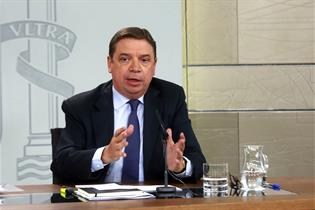 Pool Moncloa/JM CuadradoThe Minister for Agriculture pointed out that Spain argues, together with another 19 Member States of the European Union, that the CAP has a "big enough budget" to tackle the challenges in this new period. As opposed to the proposal made by the European Commission to reduce subsidies under the first pillar - direct payments and market measures - by 3.5%, and the second pillar - rural development plans - by 14.5%, the Government of Spain considers it necessary "to re-establish sufficient levels to allow us to respond to the challenges we are facing at this time".
Pool Moncloa/JM CuadradoThe Minister for Agriculture pointed out that Spain argues, together with another 19 Member States of the European Union, that the CAP has a "big enough budget" to tackle the challenges in this new period. As opposed to the proposal made by the European Commission to reduce subsidies under the first pillar - direct payments and market measures - by 3.5%, and the second pillar - rural development plans - by 14.5%, the Government of Spain considers it necessary "to re-establish sufficient levels to allow us to respond to the challenges we are facing at this time".
As regards the new architecture of the CAP, Luis Planas said that Member States accept the Commission's idea to design, through national strategic plans, the policy for farmers, livestock breeders, foresters and the rural environment and to send this to Brussels for approval. The minister highlighted the collaboration between the government and the regional governments in this field, as well as the contributions made by professional associations of farmers and environmental bodies.
Role of women and sustainability
Among the goals of the CAP as from 2020, the minister stated that one goal is "particularly important" for the Government of Spain: gender policy. "We sought, and the European Parliament supports us on this matter, to include the role of women in rural environments, their presence and entrepreneurship", he declared. For Spain, which is suffering from progressive depopulation in many areas, it is also fundamental for the CAP to contribute to maintaining the activity in the countryside from one generation to the next, stated Luis Planas.
The minister advocated maintaining direct aid and for the beneficiaries of the CAP to be professional farmers and family businesses, "which constitute the vast majority of the small- and medium-sized holdings that are the very foundation of the agri-food sector" in Spain. To this end, he advocated stepping up aid for the first hectares and establishing ceilings as from 100,000 euros per beneficiary.
Lastly, Luis Planas stated that the CAP should not only concern itself with the profitability of farm holdings, but also with environmental sustainability, "which is the key to their survival and the protection of our natural habitats".
Recognition of Republican exile
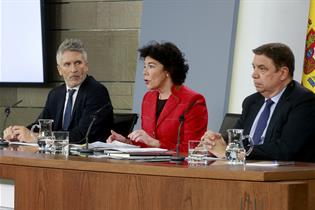 Pool Moncloa/JM CuadradoThe Council of Ministers agreed to set up the Inter-ministerial Committee for the Commemoration of the 80th anniversary of the Spanish Republican exile.
Pool Moncloa/JM CuadradoThe Council of Ministers agreed to set up the Inter-ministerial Committee for the Commemoration of the 80th anniversary of the Spanish Republican exile.
Isabel Celaá recalled that the 80th anniversary of the end of the Spanish Civil War falls in 2019, and of the "major exodus of Spanish Republicans to France, North Africa and Ibero-American States, particularly Mexico". The Inter-ministerial Committee will identify the commemorative events to be held to pay tribute "to those Spaniards who were forced to leave their own homeland", she remarked.
Other agreements
- Extension to the scope of application of damage to municipal infrastructures caused by natural disasters in 2016 and 2017.
- Amendment to prevailing legislation on the protection of animals used for experimentation.
- Authorisation of direct subsidy of 32.7 million euros to the Spanish Red Cross to attend to immigrants arriving on the Spanish coast.
Weekly assessment
In her weekly review of current affairs, Isabel Celaá declared that the government considers that the agreement reached on Brexit between the European Union and the United Kingdom "is not perfect, but represents an achievement" for both parties.
"The Government of Spain would have much preferred the United Kingdom to have remained in the EU, but given its regrettable decision, it is important to stress that it is much better to reach a withdrawal agreement than see a breakaway", she argued.
The Government Spokesperson added that the government is "very satisfied" at the inclusion of the protocol on Gibraltar negotiated between Spain and the United Kingdom, which has to be ratified by the European Union and the British Government.
Government will not abandon automotive sector
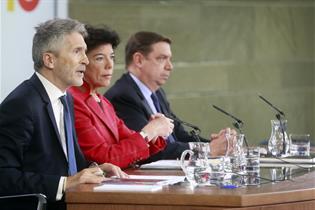 Pool Moncloa/JM CuadradoOn another note, Isabel Celaá recalled that the Ministry of Ecological Transition presented the draft Climate Change Act, which it hopes to submit for its passage through Parliament before the end of the year and reach agreement with the other political formations. This new law states that as from the year 2040, vehicles that directly emit carbon dioxide may not be sold in Spain.
Pool Moncloa/JM CuadradoOn another note, Isabel Celaá recalled that the Ministry of Ecological Transition presented the draft Climate Change Act, which it hopes to submit for its passage through Parliament before the end of the year and reach agreement with the other political formations. This new law states that as from the year 2040, vehicles that directly emit carbon dioxide may not be sold in Spain.
The minister claimed that the government is under "an obligation to give a major boost to renewable energies and to support the automotive industry in making an orderly transition to replace combustion vehicles with other more ecological vehicles within a reasonable timeframe".
"Neither the automotive industry nor our citizens will be abandoned during this process. The Government of Spain is aware of the vital importance of the process and is working very closely with the car industry", she stressed.
Non official translation





